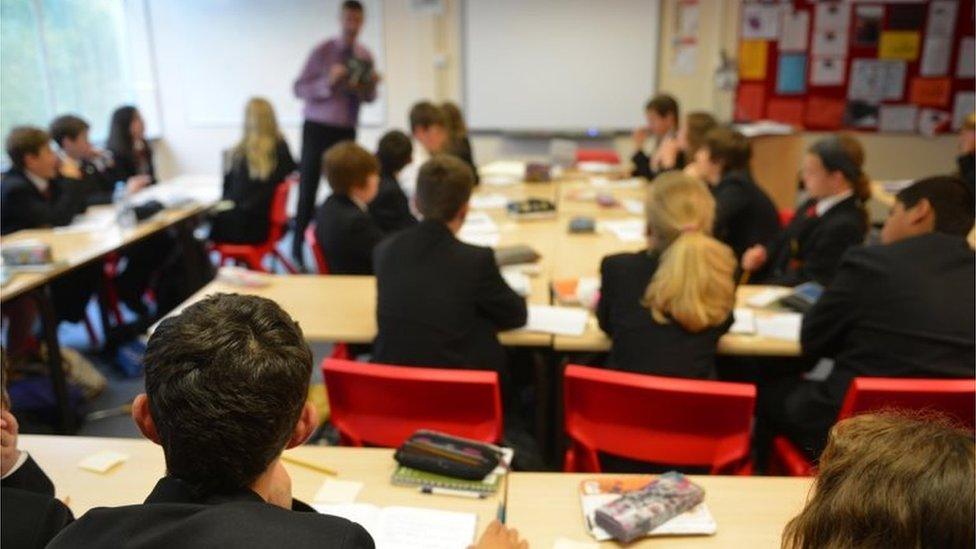Grammar schools: Strong opinion in 'emotive' debate
- Published
A lesson in grammar schools
Education Secretary Justine Greening says the government will take a "pragmatic" look at new grammar schools - but recognises there is an "emotive" debate over the issue.
Labour says ministers are showing a "dangerous misunderstanding" of issues facing schools in England.
We spoke to parents and ex-pupils with strong opinions on both sides of the debate.
The parents' views:
David Noble, 42, East Finchley, London

"I am a Conservative Party activist and married to a primary school teacher. I have two kids going to a new free school. I am very against opening new grammar schools.
"Education is paid for by the taxpayer and so should therefore be uniformly excellent in all state schools. With technology this may one day be achievable.
"Would anybody want a two-tier health service, police force or fire brigade? The answer is no. We should not have this in state education.
"Grammar schools benefit the middle and wealthy classes as those are the people who can pay for tutoring. This is a fact and it outrages me that some in the Conservative Party ignore this.
"I speak to some people who are massively pro-grammar schools purely from the perspective that they see it as saving £15,000 a year on private school education. They would throw the kitchen sink at their kids - by tutoring them - to get them to pass the 11-plus.
"The wealthy and middle classes already have private schools and a postcode lottery that works in their favour, so why give them a third option?
"A better model is streaming or a competitive environment in state comprehensive schools."
Scott Greenwood, 50, Greenwich, London

"The standard of non-grammars is not high enough. I agree that all schools should improve - but how long will that take? Should my son's education suffer whilst they try to sort out the problems?
"My son is 11 and has just started at a grammar school. He was lucky, he was able to take the 11-plus for a school in Kent as there aren't any in Greenwich.
"We did pay for extra tuition, but we also found the time to give him home tuition and installed a real work ethic into him. All the hard work he put in has paid off.
"And he was very keen to go to a grammar school even though most of his friends were going to a different school up the road.
"When we took him to see various schools, he could see the extra subjects and opportunities available at the grammar.
"If he went to a non-grammar he would be so far ahead of most of the other kids that the teachers wouldn't be able to give him the push he needs.
"If we educate all our children to mediocre standards then who will become a doctor, lawyer or a politician? They will only be fit to do menial jobs and not have the skills to become leaders or scientists and push the boundaries."
The ex-pupils' views:
Maggie Craig, 60, Croydon, Surrey

"I am the middle child, my elder brother and younger sister passed their 11-plus. I failed and went to the comprehensive school.
"After that I felt like a failure. I felt like I was the stupid one in the family. At the time, the view in society was that if you didn't go to a grammar school you had to do the more menial jobs.
"When I left school I felt I had less options and of course I wasn't able to take the same exams as my siblings, doing CSEs instead of O-levels.
"I still had a good time at school and was top of my classes there. But my brother and sister had more chances to go abroad on school trips. I felt I was missing out.
"Later, after I was married and had children I did evening classes to better myself. I had been working in catering for many years but I wanted to get better work. After the classes I got a job in administration.
"It would be stupid to bring grammar schools back and make so many children feel like failures. You shouldn't have to take a test at the age of 11."
Denise Taylor, 72, Merseyside

"I attended a grammar school, I went to university, I became a teacher and then head teacher of a secondary school.
"My parents were very working class, we lived in a council house and we were poor - but they valued education and encouraged me to do well at school.
"At the grammar school there was a strong ethos of achievement and a work ethic which was not disturbed by poor behaviour and disruption of learning in lessons.
"This is the strength of grammar schools. Quite simply the children want to learn, they want work and they do achieve.
"Removal of this from poor working class children with ability has considerably reduced their chances of a good education.
"However, the downside of this for the children who do not secure a place - or who do not have the ability to do so - is unacceptable. Any increase in selection should be accompanied by appropriate support for the education of these children.
"The most important thing for a successful education is the support of parents for the school and the provision of classes with good behaviour and good teaching. This is what grammar schools provide."
Pauline Messenger, 67, Norfolk
"Living in Buckinghamshire, as I did then, my own daughter had access to the grammar school system.
"She attended a highly-respected local grammar, where she gained an excellent education, leading to further education opportunities at university.
"I attended a grammar school in Islington, London and my past experiences there recommended the whole grammar school ethos to me.
"Born into a poor locality, living in a council flat, my grammar school provided me with the opportunity to 'better' myself and have access to a better, greatly improved way of life and better career.
"I very much feel other children from similar backgrounds should have those opportunities.
"For those children with high ability, it is good for them to be in a class along with others possessing equal learning ability because everyone then moves along at the same pace and no-one is held back."
Nathan Williams, BBC UGC and Social News team
- Published8 September 2016

- Published8 September 2016

- Published26 July 2016